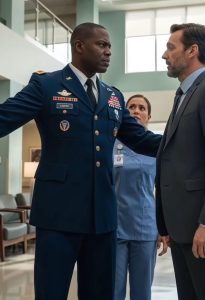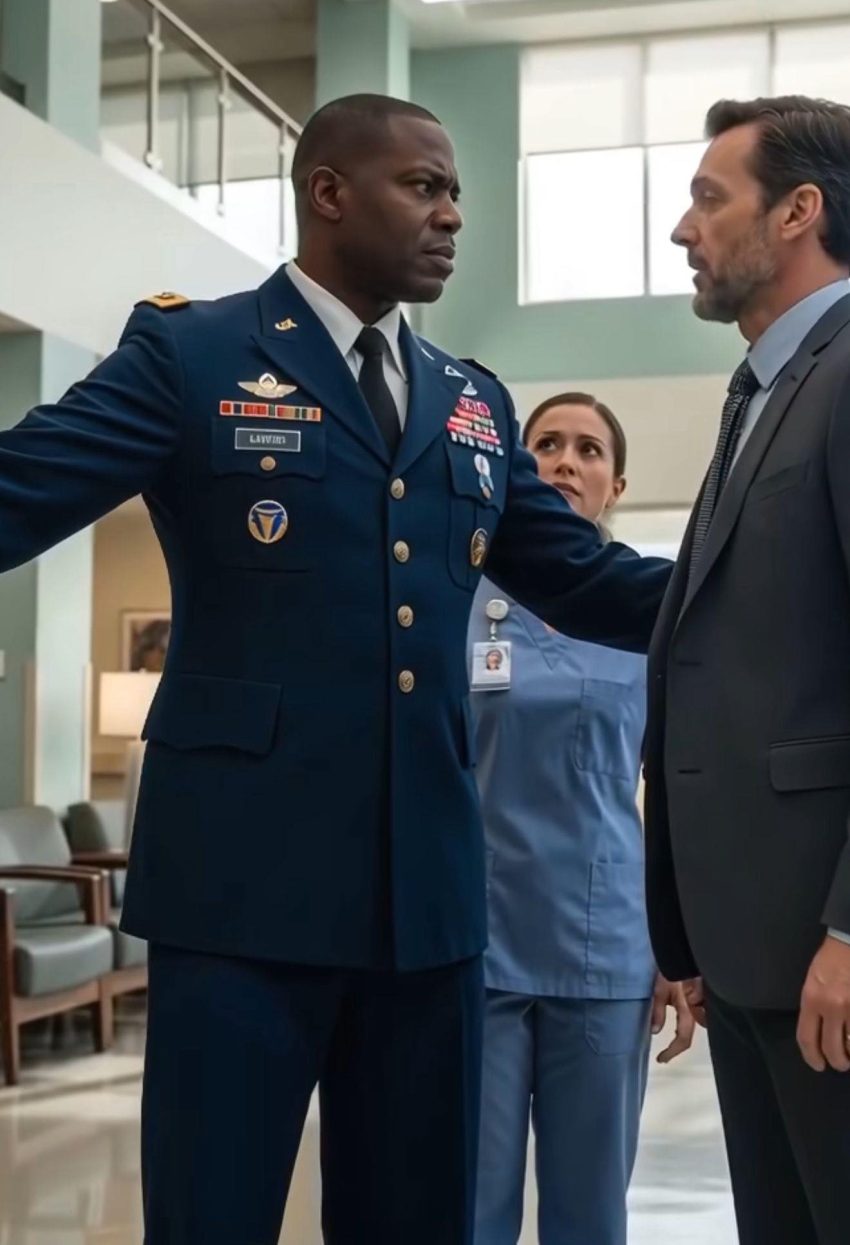At Riverside General Hospital, Clare Morgan had been a nurse for eleven years when everything changed. She wasn’t the kind of nurse who just followed paperwork and rules. She was the one who put blankets under tired feet, brought extra applesauce to patients who couldn’t eat, and never rolled her eyes when someone asked a question for the third time in ten minutes. She had a soothing voice, a strong spine, and a serenity that made scared families stop shaking. Patients loved her. Her coworkers respected her. Administrators put up with her, largely because she made their jobs simpler.
But the truth was that Clare had always been on the edge between policy and compassion. Even when the system didn’t work, she did her best to obey the rules. She had seen people turned away from care because their insurance had run out, they didn’t have ID, or the computer system just didn’t recognize their names. Every time, she felt like a small part of her integrity was breaking. She had been fixing those cracks for years with sweet words and quiet workarounds. It wasn’t enough one day.
The sky was thick with rain that morning, and it was very humid. The emergency department was already too busy. In the waiting room, twelve people were coughing, pacing, holding tissues to their faces, or holding wounds in their hands. She had just finished working on a trauma case, which was a boy who had broken his collarbone in a bike accident, when she noticed him.
The man was standing close to the door, as if he didn’t know if he could come in. His boots were covered with grime, his jeans were stiff with hardened mud, and his shirt was two sizes too big and faded from the sun. Under the fabric, his left leg was swollen. Clare could see how he moved his weight uncomfortably from across the room, favoring the injury. His beard was messy, his skin was burned from the sun, and his eyes were sleepy. Very sleepy. As if he hadn’t slept in days.

He walked up to the intake window and offered a slight, almost shy nod. He said, “Excuse me.” “I think I need help.”
The receptionist didn’t look up. “Do you have coverage?”
“No, ma’am.”
“ID?”
He took off his shirt and pulled out a pair of old dog tags. “U.S. Army Walter Briggs.”
She looked at the tags for a second before turning her screen around. “I’m sorry, but we can’t help you without proof of address or insurance.” Policy of the hospital.
Clare, who was just a few steps away, felt her gut tighten. She moved closer.
“Sir, is there something wrong with your leg?”
Walter thought for a moment, then gently drew up his pant leg to show a jagged wound that was leaking pus and had angry, red skin around it. Clare could smell the illness right away. Without thinking, she moved forward.
She responded, “This needs treatment now,” and she was already reaching for gloves in her pocket. “This could get infected.”
The charge nurse heard and stopped it. “Don’t, Clare.” He hasn’t been let in yet. You know what the rules are.
Clare blinked. “So what is he meant to do? Go? “Go limp and wait to die on the sidewalk?”
“We can’t help people who aren’t in the system.”
Clare looked back at Walter, who was standing steady and quiet, trying not to draw attention to himself. “That doesn’t mean he doesn’t need help.”
The charge nurse responded sternly, “You know the rules.” “He doesn’t have coverage.” Such an event is a risk.
That word—liability—hit me like a slap.
At that point, Clare was different. Not in a rash fashion, but with a calm, steady sense of rightness. As if a door were quietly closing behind her. She looked at Walter.
“Come with me.”
She took him to a little alcove off the waiting area where the supply cabinets were only half full and the security cameras couldn’t see. She crouched down in front of him, opened her medical bag, and started working. Her hands were still. She cleansed the wound well, put a bandage on it, and gave her a broad-spectrum antibiotic from the emergency cache in her personal bag. She always kept this kind of medicine on hand for emergencies like this. She handed him water, crackers, and even a protein bar from her locker.
She tenderly wrapped his leg and said, “You served this country.” “The least I can do is help you.”
Walter didn’t talk much. A soft “Thank you, ma’am.” He didn’t let his tears fall, even though his eyes were wet.
A security guard was standing nearby when she was done. The administrator had been told.
Richard Hail was a guy of rules. Always has been. He once said no to a pizza party for all personnel because it went against food policy in clinical areas. He strode into the ER like he owned the place and told Clare to come to his office without saying a word.
He started coldly, “You gave medicine to a man who didn’t have insurance or a driver’s license.”
“I helped a veteran who was hurt,” she said.
“You did things that were against the rules, against the system, and against your clearance.” That care is not allowed.
Clare didn’t move. “He might have died.”
“That’s not your choice.” You are suspended right away. “Leave your badge.”
And just like that, she was gone. She was gone after one act of kindness. No hearing. No second chances.
She sat in her car for a long time after that, with her keys on her lap, going over it again and again. Would she do it again?
“Yes,” she said to herself. “All the time.”
A young nurse posted something on social media later that night without giving her name. It was just one sentence: “A nurse at Riverside General was put on leave today for helping a homeless veteran.”
Within hours, that sentence went viral.
The following day, the hashtag #JusticeForClare gained widespread attention. Groups of veterans shared it. Nurses’ unions shared it again. A journalist from the area wrote about it first, then a national one. People who used to be Clare’s patients come forward. A lot. Then hundreds. The hospital’s inbox was full of letters. There were protesters outside.
Riverside General didn’t say anything. They didn’t say anything. But the hospital started to change on the inside. Staff began to wear flag pins as a way to protest without saying anything. There were handwritten notes in lockers that said, “We see you, Clare.” One morning, even Hail’s office door was inexplicably locked shut. No one said it was a hoax.
And then, a few days later, a black government SUV parked in the hospital’s visitor parking. General Thomas Avery stepped out, and his decorations shone through his coat. He was a general with four stars. And he had come for Walter Briggs.
General Avery stood next to Walter and Clare at a press conference outside the hospital. He informed everyone that Walter had saved his life in Iraq during a shootout. Twice. That he owed him everything. And that this country owed him more than a bed and a cold shoulder.
He turned to Clare and waved on live TV.
He said, “You remembered what we fight for.”
The crowd went wild. The picture included the general, the nurse, and the homeless veteran, all of whom had finally come into view.
Riverside General had to do it. The board gave Clare her job back. In public. Two days later, the administrator quit.
Clare was given a new job as a Veteran Care Liaison, which was the first of its type in the state. She was responsible for making sure that no veteran was ever turned away again. Walter was the first person she officially referred. They became buddies and had coffee together every Tuesday. He brought little flags of the United States. She brought bars of protein.
Lawmakers were interested in the story. A state legislator wrote the Clare Morgan Act, which says that in emergencies, all hospitals must treat veterans without checking their insurance first. Everyone voted for it.
A new medical resident came up to Clare in the ER years later. He felt anxious. He said, “There’s a Marine out front.” “No ID.” No coverage. “What should I do?”
Clare smiled. “Take care of him. If someone bothers you, tell them to call the general.
Sometimes, doing the right thing involves not following the rules. And occasionally, a single act of bravery can change everything—a policy, a hospital, or even a whole country.
And it just needed one nurse who didn’t want to look away.
